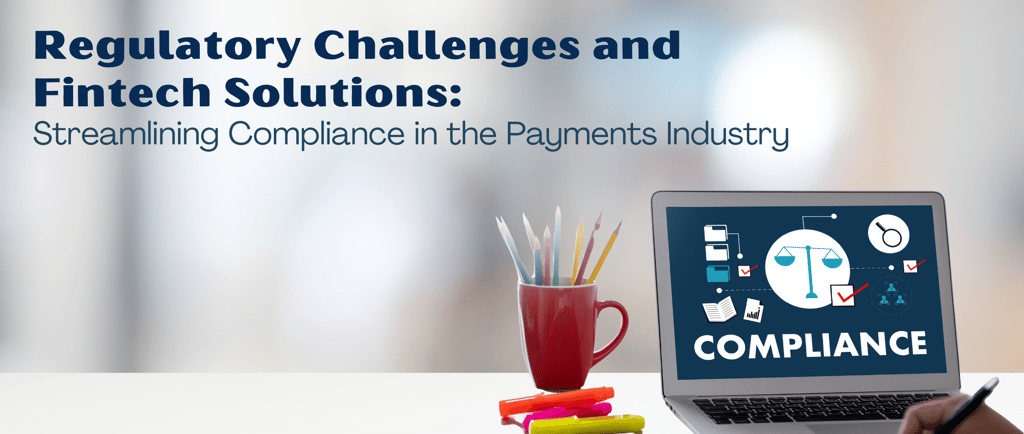Regulatory Challenges and Fintech Solutions: Streamlining Compliance in the Payments Industry


The payments industry has undergone significant transformation over the past decade, driven by rapid technological advancements and the rise of fintech solutions. However, alongside these developments, the regulatory landscape has grown increasingly complex. Navigating this maze of regulations is crucial for ensuring compliance and maintaining the integrity of payment systems. This blog explores the regulatory challenges faced by the payments industry and how fintech solutions are streamlining compliance.
The Regulatory Landscape in Payments
Data Protection and Privacy: Regulations such as the General Data Protection Regulation (GDPR) in Europe and the California Consumer Privacy Act (CCPA) in the United States have set stringent standards for data protection and privacy. Payment providers must ensure that customer data is handled with the utmost care, with explicit consent and robust data security measures.
Anti-Money Laundering (AML) and Counter-Terrorism Financing (CTF): AML and CTF regulations require payment providers to implement rigorous customer verification processes, monitor transactions for suspicious activities, and report any suspicious behavior to relevant authorities. Compliance with these regulations is vital to prevent the misuse of payment systems for illegal activities.
Know Your Customer (KYC): KYC regulations mandate payment providers to verify the identities of their customers before allowing them to use their services. This involves collecting and verifying personal information, which can be resource-intensive and time-consuming.
Payment Card Industry Data Security Standard (PCI DSS): PCI DSS is a set of security standards designed to ensure that all companies that accept, process, store, or transmit credit card information maintain a secure environment. Compliance with PCI DSS is essential for protecting cardholder data and preventing data breaches.
Fintech Solutions for Regulatory Compliance
Automated Compliance Tools: Fintech companies are leveraging advanced technologies such as artificial intelligence (AI) and machine learning (ML) to develop automated compliance tools. These tools can streamline the compliance process by automatically monitoring transactions, flagging suspicious activities, and ensuring that all regulatory requirements are met in real-time.
Digital Identity Verification: Digital identity verification solutions use biometric data, document verification, and other digital methods to verify customer identities quickly and accurately. This not only speeds up the KYC process but also reduces the risk of identity fraud.
Blockchain Technology: Blockchain technology offers a transparent and tamper-proof way to record transactions. This can be particularly useful for AML and CTF compliance, as it provides a clear and immutable record of all transactions, making it easier to detect and prevent illegal activities.
RegTech Platforms: Regulatory technology (RegTech) platforms provide a centralized solution for managing compliance. These platforms can integrate with existing payment systems, offering real-time monitoring, reporting, and compliance management features. By centralizing compliance efforts, RegTech platforms make it easier for payment providers to stay up-to-date with evolving regulations.
The Future of Regulatory Compliance in Payments
As the payments industry continues to evolve, regulatory compliance will remain a critical challenge. However, with the help of fintech solutions, payment providers can streamline their compliance efforts and focus on delivering innovative and secure payment experiences to their customers. By embracing advanced technologies and integrating them into their compliance strategies, payment providers can navigate the complex regulatory landscape and stay ahead of the curve.
In conclusion, the interplay between regulatory challenges and fintech solutions is shaping the future of the payments industry. As regulations become more stringent and the demand for secure and efficient payment systems grows, the role of fintech in streamlining compliance will become increasingly important. By leveraging the power of technology, payment providers can ensure compliance, enhance security, and drive innovation in the payments industry.
